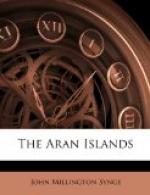Sometimes a man is named from the colour of his hair. There is thus a Seaghan Ruadh (Red John), and his children are ’Mourteen Seaghan Ruadh,’ etc.
Another man is known as ‘an iasgaire’ (’the fisher’), and his children are ‘Maire an iasgaire’ (’Mary daughter of the fisher’), and so on.
The schoolmaster tells me that when he reads out the roll in the morning the children repeat the local name all together in a whisper after each official name, and then the child answers. If he calls, for instance, ‘Patrick O’Flaharty,’ the children murmur, ’Patch Seaghan Dearg’ or some such name, and the boy answers.
People who come to the island are treated in much the same way. A French Gaelic student was in the islands recently, and he is always spoken of as ‘An Saggart Ruadh’ (’the red priest’) or as ’An Saggart Francach’ (’the French priest’), but never by his name.
If an islander’s name alone is enough to distinguish him it is used by itself, and I know one man who is spoken of as Eamonn. There may be other Edmunds on the island, but if so they have probably good nicknames or epithets of their own.
In other countries where the names are in a somewhat similar condition, as in modern Greece, the man’s calling is usually one of the most common means of distinguishing him, but in this place, where all have the same calling, this means is not available.
Late this evening I saw a three-oared curagh with two old women in her besides the rowers, landing at the slip through a heavy roll. They were coming from Inishere, and they rowed up quickly enough till they were within a few yards of the surf-line, where they spun round and waited with the prow towards the sea, while wave after wave passed underneath them and broke on the remains of the slip. Five minutes passed; ten minutes; and still they waited with the oars just paddling in the water, and their heads turned over their shoulders.
I was beginning to think that they would have to give up and row round to the lee side of the island, when the curagh seemed suddenly to turn into a living thing. The prow was again towards the slip, leaping and hurling itself through the spray. Before it touched, the man in the bow wheeled round, two white legs came out over the prow like the flash of a sword, and before the next wave arrived he had dragged the curagh out of danger.
This sudden and united action in men without discipline shows well the education that the waves have given them. When the curagh was in safety the two old women were carried up through the surf and slippery seaweed on the backs of their sons.
In this broken weather a curagh cannot go out without danger, yet accidents are rare and seem to be nearly always caused by drink, Since I was here last year four men have been drowned on their way home from the large island. First a curagh belonging to the south island which put off with two men in her heavy with drink, came to shore here the next evening dry and uninjured, with the sail half set, and no one in her.




